Released in January 2023, the Hindi movie “Pathaan” has been one of the most anticipated Bollywood films in recent years, as it is film star Shah Rukh Khan’s comeback after five years and also includes notable names like Deepika Padukone and John Abraham. As the fourth installment in the YRF Spy Universe and revolving around themes of patriotism and community, the film focuses on a spy’s journey in stopping a rogue agent and protecting his country.
The titular character, Pathaan, played by Khan, is a veteran agent whose mission is to stop Jim, played by Abraham, a rogue agent who leads an international terrorist organization and tries to spread a deadly disease, Raktbeej, to millions of people. Pathaan encounters various other spies and agents on his mission and flies to places around the world before the movie ends with a satisfying resolution that successfully enthralls fans with Khan’s acting once again.
Nevertheless, the storyline of the film lacked character and plot development, which made it hard to fully enjoy the film. The motives for the antagonist, Jim, fell short of a villain terrorizing an entire country. His reasoning for taking revenge was for his family who was cruelly killed, but as the movie progressed his vengeance landed on attacking millions of innocent people. While there were implications of Jim’s possible psychological disorders, it was not fully elaborated on. Jim lacked the depth needed for a character vital to the story.
The plot could have also been developed better. There was nothing overly new about “Pathaan,” especially for a film that has been hyped for years. The storyline felt repetitive, clearly taking generous inspiration from many Hollywood and Bollywood flicks and mushing the tropes together. Irritatingly, Raktbeej mirrored COVID-19 but on a deadlier level, hackneying the trend of using the pandemic as a plot device. Most flashbacks are never elaborated on further, instead adding random time jumps and emotional moments that create lulls in the story.
The movie could have also ended much earlier in a scene where Pathaan and Rubina, a Pakistani agent played by Padukone, who seemingly appeared out of nowhere, chased and cornered Jim on an iced-over lake. The scene could have been a good resolution where the heroes steal back the virus from Jim and protect their countries. Instead, there was a misstep in the fight scene, Jim gets away with the virus and the end was unnecessarily prolonged.
However, the editing and cinematography made the film much more captivating and engaging. Filled with suspenseful plot twists and exciting cameos, the action-packed scenes were gripping, and while a bit over-the-top at times, it created much-needed flair to reel the audience into the movie.
Additionally, the charismatic acting holds the movie together. While this film is Khan’s come-back, Padukone stole the show with her thrilling fight scenes and alluring performance as a character with a dauntless personality. Abraham’s performance as the antagonist also advanced the film’s flair, from his dramatic introduction of blowing up a car to the inevitable end of his character. The emotions portrayed by the actors exemplified their characters and brought the script to life, adding more style and sophistication to the amateurish storyline.
Despite the growing Hindu nationalism trend currently overtaking Bollywood cinema, Khan, as a Muslim man, openly portrayed his pride for the Muslim community through his character. In the movie, Pathan saves a small Afghan town from a bomb explosion, earning the trust and love of the community. This town plays a major part in Pathaan’s character development and foils Jim’s heinous plans. By not pigeonholing the Muslim or Pakistani characters as villains, the movie emphasizes the openness of religion and opposes the religious intolerance of right-wing Indian groups.
While far from perfect, “Pathaan” highlights Khan’s acting as he returns to the Bollywood industry from his prolonged break. This super-spy action thriller had many exciting moments, but it was hard not to expect more from a movie starring prominent Bollywood actors. By overusing trends and overlooking the holes in the storyline, the potential of this movie was not taken advantage of. The plot was very predictable and prolonged, having lots of room for improvement, but the acting and action made up for the other inadequacies of the movie, showcasing the actors’ refined talents and exemplifying the importance of community.





